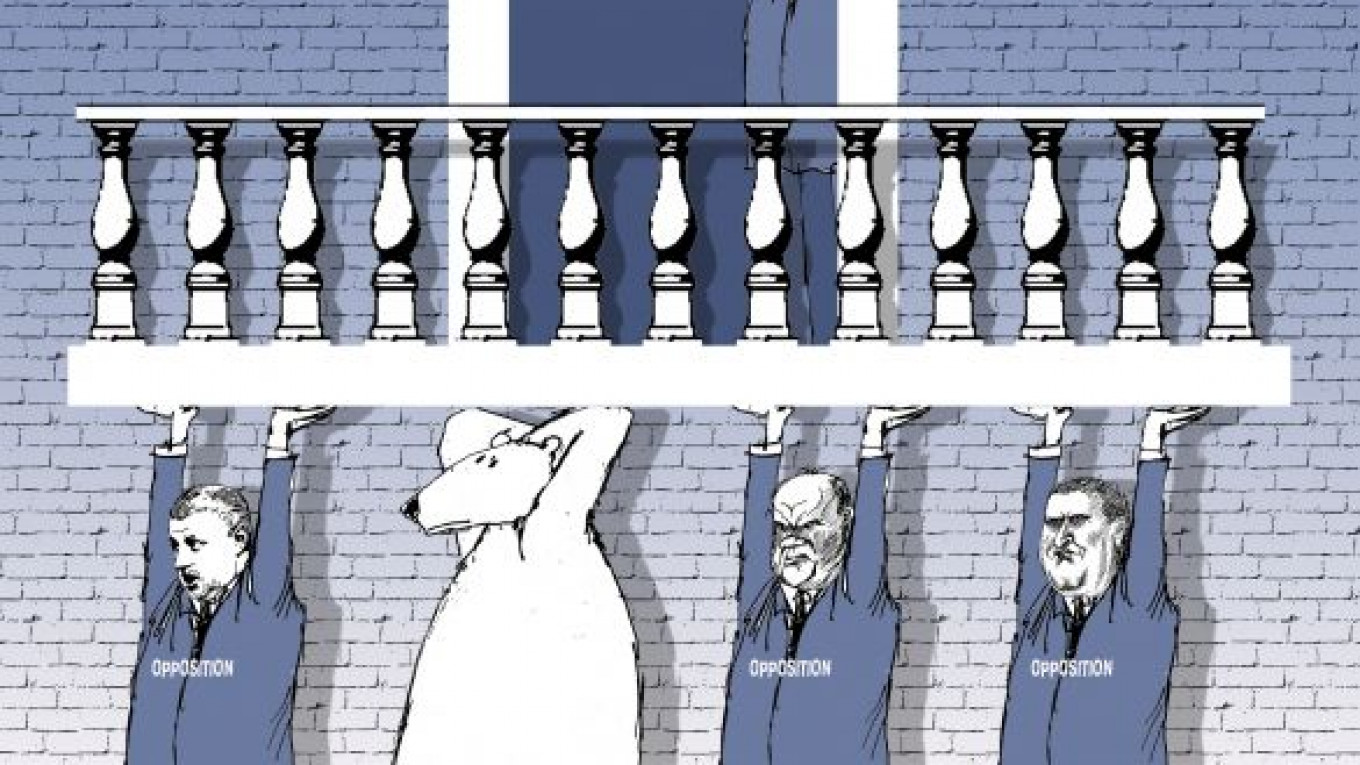Few were surprised when President Vladimir Putin showed up two hours late for a meeting on July 19 with the leaders of the four State Duma parties. Putin ostensibly was delayed because of a meeting with Juan Carlos I, the king of Spain. Although Putin has showed over the past decade that these delays are standard procedure for him, this tardiness was particularly revealing as it showed Putin's disregard for the chamber. It also showed how servile the Duma is to the Kremlin. If the Duma were independent, Putin would probably not have shown up so late, and the leaders of the parties would not have waited so meekly and submissively for two hours before he finally appeared.
A day earlier, the Federation Council reappointed 69-year-old Vyacheslav Lebedev to another six-year term as the head of the Supreme Court, which he has headed since 1989. Under Lebedev's leadership, the Supreme Court and the entire judicial system have taken a remarkable journey — from its days as the punitive organ of the Communist dictatorship, through a more romantic period of judicial reforms in the 1990s, to its current state marked by the de facto merging of the court with three key siloviki organizations: the Investigative Committee, the Prosecutor General's Office and the Federal Security Service. This makes the judicial system an integral part of Putin's power vertical.
Lebedev was at the helm when the courts arrested, tried and convicted former Yukos CEO Mikhail Khodorkovsky and his former business partner Platon Lebedev. Lebedev is now in charge of the court system that is trying three young women of the Pussy Riot punk group.
It is clear why United Russia senators reappointed Lebedev to his post. His leads the type of court system that the ruling bureaucracy needs to maintain its corrupt system. But Lebedev's reappointment would not have been possible had the so-called opposition parties in the Duma not danced to the tune of the ruling party.
In order for Lebedev to continue at his post, it was necessary to amend the Constitution by removing the age limit of 70 years for the Supreme Court head and his deputies. A similar limit was removed concerning the head of the Constitutional Court, a body led by the equally loyal Valery Zorkin. The current age limit was amended with the help of votes by two Duma "opposition" parties — the Liberal Democratic Party and A Just Russia.
United Russia controls both houses of parliament and can pass virtually any legislation it and the Kremlin want. Although the party lost its constitutional majority after the disappointing December Duma elections, this is really only a loss on paper. When United Russia needs a two-thirds majority to change the Constitution, the opposition parties in the Duma are always willing to lend their support.
As the majority party in the Duma, United Russia gained control over all of the key committees, including the Constitutional Committee, Budget Committee and the Rules Committee.
In addition, the Duma's four parties have strengthened their anti-Western stance, following the cues of the Kremlin. That explains how the controversial law that requires foreign-funded nongovernmental organizations that engage in "political activity" was passed almost unanimously by all of the Duma factions.
The hope that some form of debate would return to the Duma turned out to be naive. Even fiery speeches and "Italian strikes" by Just Russia Deputies Gennady Gudkov and Ilya Ponomaryov did not improve anything. When there are only two democratic deputies fighting against 448 Kremlin loyalists, it is clear that they are fighting a losing battle.
Putin, who orchestrated the creation of this puppet Duma, pretends that he is seriously discussing matters with the deputies as if the Duma were an independent legislative body. Putin, who pretends that it is the deputies who actually make the budget and approve federal expenditures, ended the meeting with a straightforward summary about the Duma's work: "Everything is being done correctly." He then paused dramatically and repeated his conviction: "Everything we do is absolutely right."
Vladimir Ryzhkov, a State Duma deputy from 1993 to 2007, hosts a political talk show on Ekho Moskvy radio and is a co-founder of the opposition Party of People's Freedom.
A Message from The Moscow Times:
Dear readers,
We are facing unprecedented challenges. Russia's Prosecutor General's Office has designated The Moscow Times as an "undesirable" organization, criminalizing our work and putting our staff at risk of prosecution. This follows our earlier unjust labeling as a "foreign agent."
These actions are direct attempts to silence independent journalism in Russia. The authorities claim our work "discredits the decisions of the Russian leadership." We see things differently: we strive to provide accurate, unbiased reporting on Russia.
We, the journalists of The Moscow Times, refuse to be silenced. But to continue our work, we need your help.
Your support, no matter how small, makes a world of difference. If you can, please support us monthly starting from just $2. It's quick to set up, and every contribution makes a significant impact.
By supporting The Moscow Times, you're defending open, independent journalism in the face of repression. Thank you for standing with us.
Remind me later.








